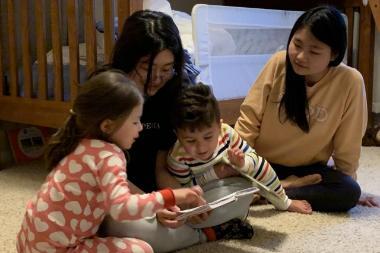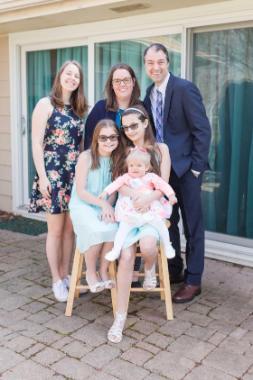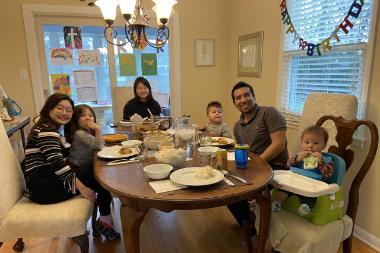May 27, 2020
Wheaton’s staff and faculty members invited students into their homes when the campus transitioned to remote learning in the wake of the COVID-19 pandemic.
 When Wheaton College transitioned to remote learning in the wake of the COVID-19 pandemic, some students—particularly international students—faced some difficult decisions. Should they return home or try to stay in the U.S.? If they traveled home, would they experience greater health risks or difficulty trying to learn online? But if they remained in the U.S., where would they stay?
When Wheaton College transitioned to remote learning in the wake of the COVID-19 pandemic, some students—particularly international students—faced some difficult decisions. Should they return home or try to stay in the U.S.? If they traveled home, would they experience greater health risks or difficulty trying to learn online? But if they remained in the U.S., where would they stay?
Processing those decisions took an emotional toll, according to Jerry Woehr, director of International Student Programs.
"Many international students were affected by the pandemic much earlier than other community members," Woehr said. "They felt the stress of watching COVID-19 make an impact on their home countries and families while trying to focus on school and other commitments early this semester."
But Wheaton worked quickly to support these students by providing housing and creating dining service options that would allow for social distancing. ISP also coordinated virtual check-ins to see how students were faring. As a weekly treat, the Student Engagement and Alumni and Parent Engagement teams provided Sunday night dinner deliveries from restaurants, such as Los Burritos and Augustino’s Rock and Roll Deli and Grill. With the help of Residence Life, ISP staff also paired some students with faculty and staff members who hosted them for the duration of B-quad, offering stability and a warm, family environment.
Two Wheaton Families Share Their Experiences Housing Students
 When it was clear that COVID-19 was becoming a pandemic, Brian and Mandie Porick, who both work on staff at Wheaton, started praying about ways they could help.
When it was clear that COVID-19 was becoming a pandemic, Brian and Mandie Porick, who both work on staff at Wheaton, started praying about ways they could help.
"Many of the ways that seemed obvious would have been hard for our family due to the age span of our kids and some underlying health conditions we have," Mandie said. "We settled on hosting a student in need of housing."
Meanwhile Anika Huddleston, a rising senior studying anthropology, was studying abroad in Croatia. Just 11 days into her trip, she was sent back to the U.S. because of rising COVID-19 rates. She spent the next two weeks quarantining with her Wheaton roommate’s family in Texas where she also had to decide what to do: find a way to go home to Japan in the middle of a pandemic or secure alternative housing arrangements.
In late March, when the Poricks saw a plea for housing for "a missionary kid from Japan who works for AIT," they saw it as an answer to prayer.
As the semester drew to a close, Mandie called hosting Anika "a blast." Ruby, their 12-year-old daughter has enjoyed making chocolate chip cookies with Anika, Lucy, their 10-year -old has enjoyed playing Roblox with her, and Julia, their 10-month-old daughter has enjoyed trying out her new vocabulary word, "hi," to another person in the house.
Anika’s arrival was also the impetus for Brian, who also grew up as part of a missionary family in Japan, to brush up on his Japanese culinary skills.
"We have enjoyed shrimp tempura, curry rice, katsu don, and a few other dishes that remind Brian and Anika of home," Mandie said.
 Economics professor Dr. Enoch Hill and his wife Alissa, who hosted two students—Joy (Jihyeong) Lee from Korea who is studying Chemistry at Wheaton, and Erin Um from China who is studying International Relations and Economics–have also tried a few new dishes this semester.
Economics professor Dr. Enoch Hill and his wife Alissa, who hosted two students—Joy (Jihyeong) Lee from Korea who is studying Chemistry at Wheaton, and Erin Um from China who is studying International Relations and Economics–have also tried a few new dishes this semester.
"We take turns cooking for each other and we have come to love Korean food," Hill said. "Bulgogi is definitely my favorite so far."
The Hill children have also enjoyed their two new college-age playmates.
"One of the kids' favorite games is to play animal hide-and-seek with Erin and Joy," Hill said. "I've never heard them laugh so hard. They are so wonderful at interacting with our children."
One day while both Alissa, an adjunct Spanish professor at Wheaton, and Enoch were in the middle of teaching classes, their youngest child, 11-month-old Selah, woke up early from a nap. Erin and Joy tag-teamed to take care of Selah so the two parents could continue teaching. “It was so thoughtful of them,” Hill said. “It really does take a village.”
The Poricks echoed Hill’s sentiments: "When our children tell their children about the Pandemic of 2020, it’s neat to know that Anika will be in those stories."—Emily Bratcher